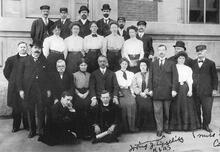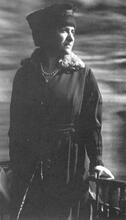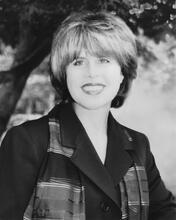Jane Friedenwald
Jane Ahlborn Friedenwald used her position as a member of one of the most prominent Jewish families in Baltimore to support and promote vital Jewish causes and institutions. Born in England and raised in Ireland, Friedenwald immigrated to America in 1863 and moved to Baltimore the following year. Her husband, Moses Friedenwald, followed in the example of his charitable family, becoming a charter member of the American Jewish Historical Society, the Jewish Publication Society, and the Jewish Theological Seminary. She donated money and artwork to the National Museum in Washington, D.C., as well as other Jewish and cultural institutions, and volunteered her time to care of people in the city of Baltimore. Her son Herbert established the Friedenwald Foundation for the Promotion of Higher Learning in memory of his parents.
Jane Friedenwald, the daughter of German Jews and connected through marriage to one of the most prominent German Jewish families in Baltimore, was a valuable member of the new American Jewish aristocracy. She dispensed charity, created and supported American Jewish institutions, bettered herself intellectually and culturally, and raised her children to honor the family name and legacy.
Early Life and Family
She was born in Manchester, England, in 1847, to German Jewish immigrants Fannie and Julius Ahlborn. Several years later, the family moved to Dublin, where Jane received her education, and in 1863, the family moved to St. Louis, Missouri. Shortly after coming to the United States, the seventeen-year-old Jane Ahlborn met Moses Friedenwald, twelve years her senior, who was the first American-born son of Merle and Jonas Friedenwald of Baltimore. The following year, Jane and Moses were married. Several years later, they moved to Baltimore, where they spent the remainder of their lives.
Early on, the Friedenwald family had established itself as a pillar of Baltimore Jewry. Emigrating from Germany in 1831 with his wife and five children, Jonas Friedenwald began a business as an umbrella merchant, and in time became a successful hardware merchant. He was one of the founders of the Hebrew Assistance Society, the Hebrew Orphans Asylum, the Hebrew Free Burial Society, and the Orthodox Congregation Chizuk Emmunah. His son Aaron and three of Aaron’s five sons became prominent Baltimore physicians. All of Jonas and Merle’s children, and many of their grandchildren, were active in Jewish and general philanthropic causes and institutions.
Political Activity and Work
Jane Friedenwald, who was variously described by those who knew her as brilliant, a true critic and splendid conversationalist, dainty, and slightly haughty, became a respected member of the Baltimore Friedenwalds. Her husband, with his brother Joseph and two brothers-in-law, established one of the largest wholesale clothing businesses in the country, Moses Weisenfeld and Company. Jane Friedenwald channeled her wealth and social standing into Jewish communal activities, serving as a charter member of the American Jewish Historical Society, the Jewish Publication Society, and the Jewish Theological Seminary. She was an active philanthropist, giving money and works of art to Jewish and cultural institutions, such as the National Museum in Washington, D.C., to which she donated forty items from her African art collection. She also devoted considerable time and effort to helping indigent and sick Jews in Baltimore.
The Friedenwalds were politically active during the Civil War, all except Aaron supporting the Confederate cause. Physically broken by his efforts during the war, Moses became an invalid and remained sickly for the remaining twenty-four years of his life. After he died in 1889, Jane Friedenwald continued as the family matriarch, engaging in philanthropic activities, serving on the boards of Jewish institutions, and socializing with prominent Jewish lay leaders and professionals. Among her acquaintances were the Szolds of Lombard Street and the social and medical elite of Baltimore. Her daughter, Racie Adler, married the eminent scholar Cyrus Adler in 1905. Friedenwald’s other two daughters also married notable Jewish Baltimoreans: the eldest daughter, Belle, married a Belmont, while Merle married Henry Hamburger.
Friedenwald’s son Herbert earned a Ph.D. from the University of Pennsylvania and became the first superintendent of the manuscript department at the Library of Congress in Washington. He devoted himself to the study of early American history and to Jewish communal work, serving as the editor of The American Jewish Year Book and the first secretary of the American Jewish Historical Society. He also established the Friedenwald Foundation for the Promotion of Higher Learning in memory of his parents.
Jane Friedenwald died in Baltimore on April 13, 1923, at age seventy-six.
Adler, Cyrus. I Have Considered the Days (1941).
Berney, Albert. “Obituary.” Papers of the American Jewish Historical Society 29: 165–167.
Blum, Isador. The Jews of Baltimore (1910).
EJ, s.v. “Adler, Cyrus”.
Fein, Isaac M. “Baltimore Jews During the Civil War.” American Jewish Historical Quarterly 60, no. 2 (December 1961): 84–91.
Friedenwald, Harry. Life, Letters and Addresses of Aaron Friedenwald (1906).
Glushakow, Abraham D. A Pictorial History of Maryland Jewry (1955).
JE, s.v. “Adler, Cyrus,” and s.v. “Friedenwald”.
Levin, Alexandra Lee. Vision: The Story of Dr. Harry Friedenwald of Baltimore (1964).
Marcus, Jacob Rader. Memoirs of American Jews, 1775–1865. Vol. 1 (1956): 303.
National Museum. Report (1906): 16. Papers of the Jewish Historical Society of Maryland.
PAJHS 29: 165–167.
Sarna, Jonathan. JPS: The Americanization of Jewish Culture, 1888–1988 (1990).
Schneiderman, Harry. “Herbert Friedenwald.” Papers of the American Jewish Historical Society 37: 463–466.
WWIAJ (1938).








